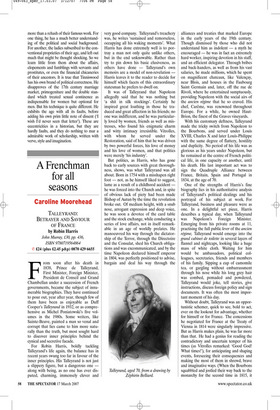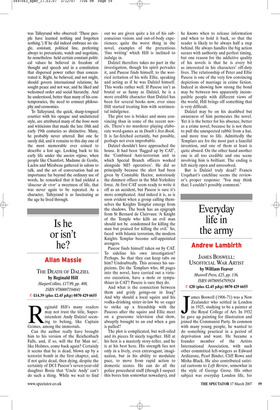A Frenchman for all seasons
Caroline Moorehead
TALLEYRAND: BETRAYER AND SAVIOUR OF FRANCE by Robin Harris John Murray, £30, pp. 436, ISBN 9780719564864 ✆ £24 (plus £2.45 p&p) 0870 429 6655 From soon after his death in 1838, Prince de Talleyrand, First Minister, Foreign Minister, President de Conseil and Grand Chambellan under a succession of French governments, became the subject of innumerable biographies. They have continued to pour out, year after year, though few of them have been as enjoyable as Duff Cooper’s Talleyrand in 1932, or as comprehensive as Michel Poniatowski’s five volumes in the 1980s. Some writers, like Sainte-Beuve, painted a man so venal and corrupt that lies came to him more naturally than the truth, but most sought hard to discover inner principles behind the cynical and secretive facade.
For Robin Harris, boldly tackling Talleyrand’s life again, the balance has in recent years swung too far in favour of the inner principles. His Talleyrand is not just a slippery figure, but a dangerous one along with being, as no one has ever disputed, charming, immensely clever and very good company. Talleyrand’s treachery was, he writes ‘sustained and remorseless, occupying all his waking moments’. What Harris has done extremely well is to portray a man not only quite unlike others, but in the end unknowable. Rather than try to pin down his basic elusiveness, as others have done — Talleyrand’s own memoirs are a model of non-revelation Harris leaves it to the reader to decide for himself which facets of this extraordinary statesman he prefers to dwell on.
It was of Talleyrand that Napoleon allegedly said that he was nothing but ‘a shit in silk stockings’. Certainly he inspired great loathing in those he traduced and great affection in his friends; no one was indifferent, and he was particularly loved by women, friends as well as mistresses, who found his enigmatic charm and witty intimacy irresistible. Vitrolles, with whom he served under the Restoration, said of him that he was driven by two powerful forces, his love of money and his love of women, and that politics were merely ‘his industry’.
But politics, as Harris, who has gone back to early sources with great thoroughness, shows, was what Talleyrand was all about. Born in 1754 with a misshapen right foot — not, as he himself liked to suggest, lame as a result of a childhood accident he was forced into the Church and, in spite of obvious lack of piety had been made Bishop of Autun by the time the revolution broke out. Of medium height, with a snub nose, arrogant expression and deep voice, he was soon a devotee of the card table and the stock exchange, while conducting a series of love affairs, not in itself remarkable in an age of worldly prelates. He manoeuvred his way through the dictatorship of the Terror, through the Directoire and the Consulat, shed his Church obligations and was excommunicated, and by the time Napoleon declared himself emperor in 1804, was perfectly positioned to advise, bargain and deal his way through the alliances and treaties that marked Europe in the early years of the 19th century. Though dismissed by those who did not understand him as indolent — a myth he encouraged — he was in fact an extremely hard worker, inspiring devotion in his staff, and an efficient delegator. Through bribes and back-handers, as well as from his vast salaries, he made millions, which he spent on magnificent chateaux, like Valençay, near Blois, and houses in the Faubourg Saint Germain and, later, off the rue de Rivoli, where he entertained sumptuously, providing Napoleon with the social airs of the ancien régime that he so craved. His chef, Carême, was renowned throughout Europe. For a while, he owned HautBrion, the finest of the Graves vineyards.
With his customary deftness, Talleyrand made the tricky switch from Napoleon to the Bourbons, and served under Louis XVIII, Charles X and later Louis-Philippe with the same degree of flattery, hostility and duplicity. No period of his life was as glorious as his years under Napoleon, but he remained at the centre of French political life, in one capacity or another, until his death. His last important act was to sign the Quadruple Alliance between France, Britain, Spain and Portugal in 1834, at the age of 70.
One of the strengths of Harris’s fine biography lies in his authoritative analysis of Talleyrand’s political dealings and his portrayal of his subject at work. For Talleyrand, business and pleasure were as one. In a delightful set piece, Harris describes a typical day, when Talleyrand was Napoleon’s Foreign Minister. Emerging from his private rooms at 11, practising the full public lever of the ancien régime, Talleyrand would emerge into the grand cabinet de toilette in several layers of flannel and nightcaps, looking like a huge mass of white cloth. Waiting for him would be ambassadors, political colleagues, secretaries, friends and members of his family. Sipping a cup of camomile tea, or gargling without embarrassment through his nose while his long grey hair was combed, pomaded and powdered, Talleyrand would joke, tell stories, give instructions, discuss foreign policy and sign documents. It was often the most important moment of his day.
Without doubt, Talleyrand was an opportunistic schemer, quick to see, bold to act, ever on the lookout for advantage, whether for himself or for France. The concessions he negotiated for France at the Treaty of Vienna in 1814 were singularly impressive. But as Harris makes plain, he was far more than that. He had a genius for reading the contradictory and uncertain temper of his times (as Vitrolles remarked: ‘Good God! What times!’), for anticipating and shaping events, foreseeing their consequences and making the most of them in shrewd, brave and imaginative ways. (When the Bourbons squabbled and jostled their way back to the monarchy for the second time in 1815, it was Talleyrand who observed: ‘These people have learned nothing and forgotten nothing.’) If he did indeed embrace no single, constant, political line, preferring always to prevaricate, watch and negotiate, he nonetheless held certain constant political values: he believed in freedom of thought and speech and in a constitution that dispersed power rather than concentrated it. Right, he believed, and not might, should govern international relations; he sought peace and not war, and he liked and welcomed order and social hierarchy. And he understood, better than many of his contemporaries, the need to connect philosophy and economics.
To Talleyrand, the quick, sharp-tongued courtier with his opaque and uncluttered style, are attributed many of the bons mots and witticisms that made the late 18th and early 19th centuries so distinctive. Many, he probably never uttered. But one he surely did, and it remains to this day one of the most memorable ever coined to describe a lost age. Looking back to his early life under the ancien régime, when people like Chamfort, Madame de Genlis, Laclos and Mirabeau gathered in salons to talk, and the art of conversation had an importance far beyond the ordinary use of words, he remarked that it had yielded a ‘douceur de vivre’ a sweetness of life, that was never again to be repeated. As a character, Talleyrand is as fascinating as the age he lived through.



































































































 Previous page
Previous page